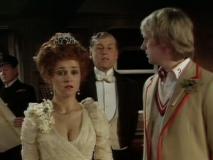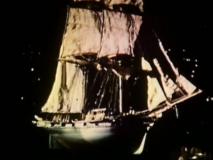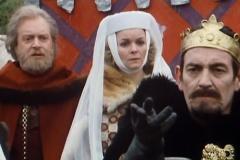An Unearthly Series - The Origins of a TV Legend
Tuesday, 23 July 2013 - Reported by Marcus

 The fifteenth in our series of features telling the story of the creation of Doctor Who, and the people who made it happen.
The fifteenth in our series of features telling the story of the creation of Doctor Who, and the people who made it happen.With the production team now working hard on the new science-fiction series, thoughts in the BBC turned to how the series would be promoted.
It was on Tuesday 23rd July 1963 - exactly 50 years ago today - that Richard Bright, the Television Publicity Organiser, circulated a memo to members of his department. He attached the format document for Doctor Who that gave a brief rundown of how the series would be broadcast, referencing The World of Tim Frazer, a Francis Durbridge crime series that had aired in 1960.
This is the first time we have undertaken a 52-part serial. It will be rather on the Tim Frazer pattern - a series of stories of varying lengths, each one starting during the last episode of the previous one. It will go on the air at 5.20-5.45 on Saturdays and is planned for family viewing with special attention to the 11-14 group.
The format document gave the planned recording times and indicated the series would start mid-November. The date of the first episode was now planned to be broadcast on Saturday 16th November, having recently been pushed back a week thanks to unplanned coverage of athletics from Moscow earlier in July, which had knocked the schedule back a week.. - Story 1: Written by Anthony Coburn. Directed by Waris Hussein Four Episodes. The story begins the journey and takes the travellers back to 100,000BC and Palaeolithic man. In this story the 'ship' is slightly damaged and forever afterward is erratic in certain sections of its controls.
- Story 2: Written by Anthony Coburn. Directed by Rex Tucker Six Episodes. This story takes the travellers to somewhere in the 30th Century, forward to the world when it is inhabited only by robots.
- Story 3: Written by John Lucarotti. Directed by Waris Hussein Seven Episodes. The travellers join the explorer Marco Polo on his Journey to Cathay.
Verity Lambert is a twenty-seven year old girl who has done a lot of commercial TV over here and has worked in the USA for David Susskind. She has been put on programme contract for a year to handle this new serial. The two directors, Waris Hussein and Rex Tucker, will be in charge of alternate stories beginning with Hussein on No. 1. Anthony Coburn is writing the first two stories and the third will be by John Lucarotti who has written a lot of television in the USA, Canada and commercial over here.
While the press department was being briefed on the new serial, a new dispute was being settled by Ronald Waldman, the General Manager of Television Enterprises, and R G Walford, the Head of Copyright. It involved a company called Zenith Film Productions Ltd which had contacted the BBC, claiming the idea for Doctor Who had originally come from them. Their claim related to a puppet series they had proposed to the Corporation called The Time Travellers, which the BBC had turned down because of its similarity to Doctor Who. Zenith now claimed that the BBC had stolen the idea and used it to create their own series. On Thursday 25th July, Walford wrote to the company to refute the allegations. The first important point I must make is that this Dr Who series was devised jointly by Sydney Newman and Donald Wilson, and I have ascertained that at the time when they worked it out they had no knowledge whatever of the suggested puppet series The Time Travellers. The scriptwriter of the first ten episodes of Dr Who is Anthony Coburn who likewise had no knowledge whatever of The Time Travellers....
... while the idea of the two programmes is similar, ie the idea of crossing time borders, the two series are themselves completely different, one being for puppets and the other being for live actors, and there could be no possibility of there being plagiarism of any sort.
The BBC did offer Zenith a special ex-gratia payment of 100 guineas as an offer of goodwill, on the understanding that it was without prejudice and that the offer made no admittance of legal liability.... while the idea of the two programmes is similar, ie the idea of crossing time borders, the two series are themselves completely different, one being for puppets and the other being for live actors, and there could be no possibility of there being plagiarism of any sort.


SOURCES: The Handbook: The First Doctor – The William Hartnell Years: 1963-1966, David J Howe, Mark Stammers, Stephen James Walker (Doctor Who Books, 1994)






















